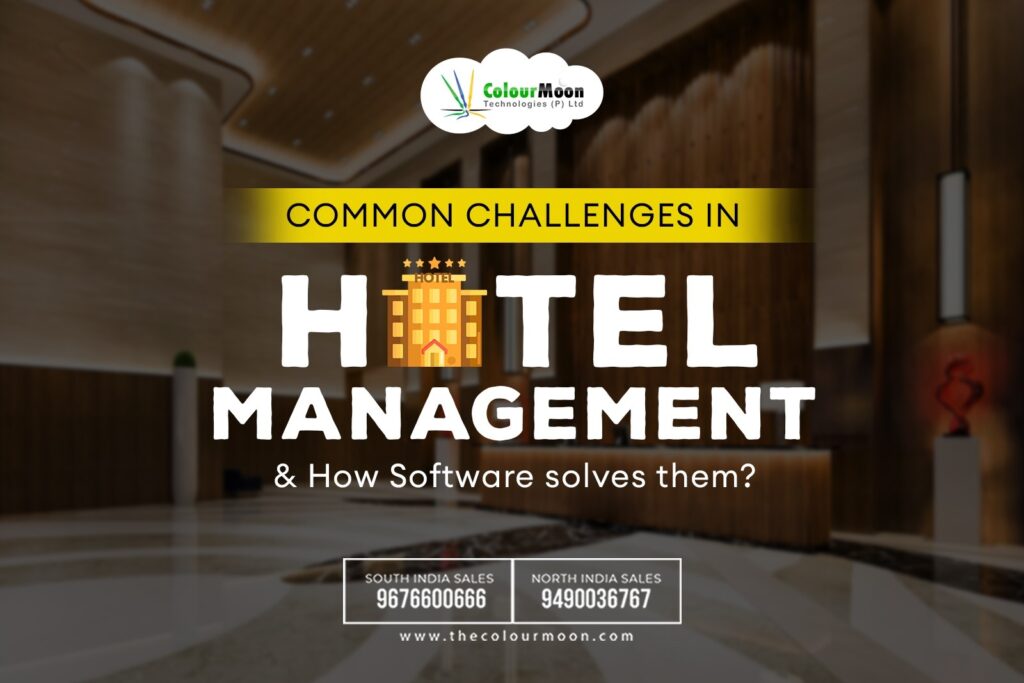The hotel industry today is experiencing big changes, and hotel management software is becoming necessary to handle common challenges in Hotel Management. This makes sense given how many different tasks hotels must handle at once. Whether you run a luxury chain of hotels or a small boutique hotel, managing multiple departments while keeping guests satisfied gives rise to many common challenges in hotel management. Coordinating everything from front desk operations to housekeeping to food service can be overwhelming without the right tools in place.
With several hotel chains running on multiple systems for front desk operations, room inventory, reservations from various booking channels, guest data management, dynamic pricing, staff coordination, and guest satisfaction tracking and business analytics, each said aspect has taken its toll of challenges, evolving into a huge operational complexity easier said than resolved by conventional methods of management.
According to the report of The Business Research Company, the Hotel Management Software market size is expected to soar up to USD 4.73 billion by 2029, with a CAGR of 6.7%, affording a great value to outperform hoteliers who are still stuck in the maze of legacy systems or are on manual platforms. Hotel management software came into being and revolutionised the industry by bringing together into unified platforms these seemingly unrelated operations. The pain points are addressed by these solutions through automation, real-time data synchronisation, and advanced analytics. Previously, when operations were decentralised, it led to inefficiencies and errors, but with hotels centralising operations, such common challenges in hotel management are now under control.
Technology has had to create seamless experiences for staff and guests alike while overcoming challenges in the back end and simplicity at user touchpoints. The Indian hoteliers face common challenges in hotel management like seasonal demand fluctuations, payment mode preferences, and regulatory requirements across states, which integrated software solutions tremendously help refute adaptively.
Looking at these common challenges in hotel management and their solutions, it is clear that a hotel management software is about changing how hotels operate at a basic level to meet what guests expect today and what businesses need to succeed in India’s growing hotel market.
Top Challenges Faced by Hotel Managers Today
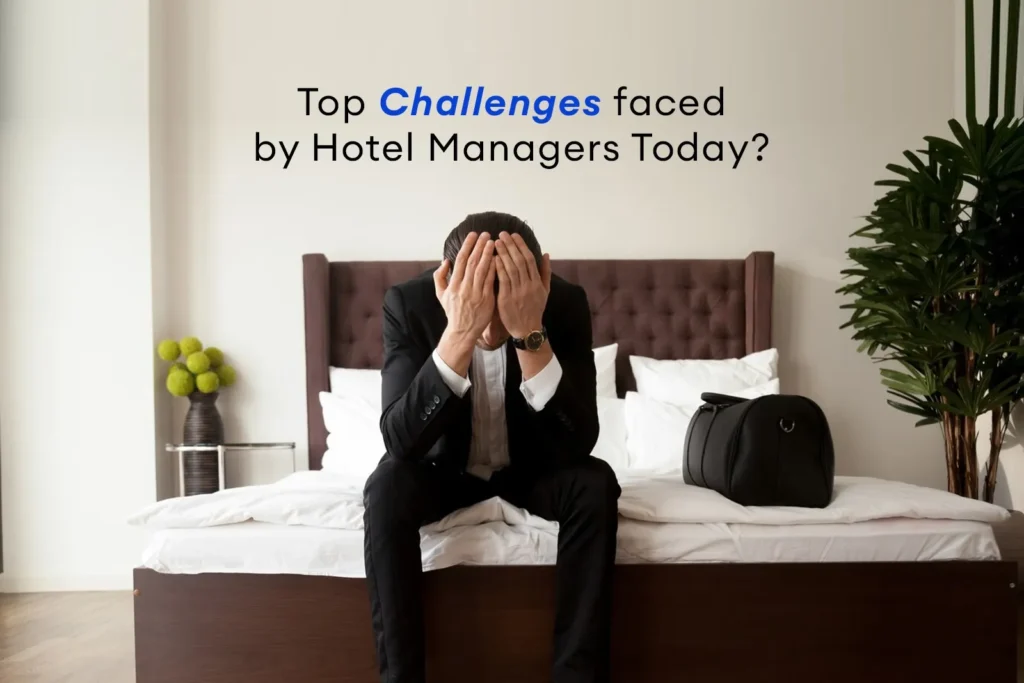
In today’s competitive hospitality sector, hotel managers face numerous common challenges in hotel management that impact both efficiency and guest satisfaction. The increasing expectations of modern travellers, coupled with complex operational demands, create a perfect storm of challenges that require innovative solutions. Let’s examine the most significant and common challenges in hotel management hotel managers encounter daily.
1. Manual Front Desk Operations & Check-In Delays
Traditional check-in processes involving paperwork and manual key handling create frustrating bottlenecks, especially during peak arrival times. Staff spend excessive time inputting data and processing payments while guests form queues. This inefficiency impacts first impressions, increases labour costs, and introduces human error risks in data entry and payment processing.
2. Inefficient Room Inventory Management
Without automated systems, managing room availability across multiple booking channels becomes a logistical nightmare. Staff must manually update room status, coordinate housekeeping schedules, and track maintenance needs. This fragmented approach leads to communication gaps, underutilised inventory, and difficulty implementing strategic room allocation that maximises revenue potential.
3. Double Bookings and Channel Management Errors
Hotels selling inventory across multiple online travel agencies, their website, and offline channels face synchronisation challenges. Without integrated systems, the same room can be sold twice, leading to overbookings, displaced guests, and compensation costs. Manual updates across platforms create lag times where booking conflicts occur, damaging guest relationships and revenue.
4. Lack of Centralised Guest Data & Personalisation
Fragmented guest information across departments prevents hotels from building comprehensive guest profiles. Without centralised data, staff cannot access previous stay information, preferences, or spending patterns. This hampers personalisation efforts, misses upselling opportunities, and creates inconsistent service experiences that fail to foster loyalty in an increasingly competitive market.
5. Revenue Leakage Due to Ineffective Pricing Strategies
Static pricing models and inability to quickly adjust rates based on demand, competition, and market trends result in significant revenue leakage. Without automated yield management, hotels either leave money on the table with underpriced rooms or lose bookings with overpriced inventory. Manual rate updates across channels create inconsistencies and competitive disadvantages.
6. Poor Staff Coordination & Task Management
Communication breakdowns between departments—housekeeping, maintenance, front desk, and food service—create operational inefficiencies. Paper-based task assignment and verbal communication lead to overlooked requests, duplicated efforts, and accountability gaps. Without clear prioritisation systems, critical guest-facing tasks may be delayed while less urgent matters receive attention.
7. Low Guest Retention & Negative Online Reviews
Hotels struggle to systematically collect, analyse, and respond to guest feedback across multiple channels. Without automated processes, negative experiences go unaddressed, leading to damaging reviews. The inability to identify recurring issues prevents strategic service improvements, while missed opportunities to engage satisfied guests reduce potential loyalty and direct bookings.
8. Difficulty in Reporting and Decision-Making
Manual data collection from disparate systems creates reporting nightmares. Management lacks real-time visibility into key performance indicators, occupancy trends, and revenue patterns. Time-consuming report generation delays strategic decisions, while inconsistent tracking methodologies produce unreliable data. This analytical handicap prevents evidence-based operational improvements and strategic planning.
How Hotel Management Software Solves These Challenges?
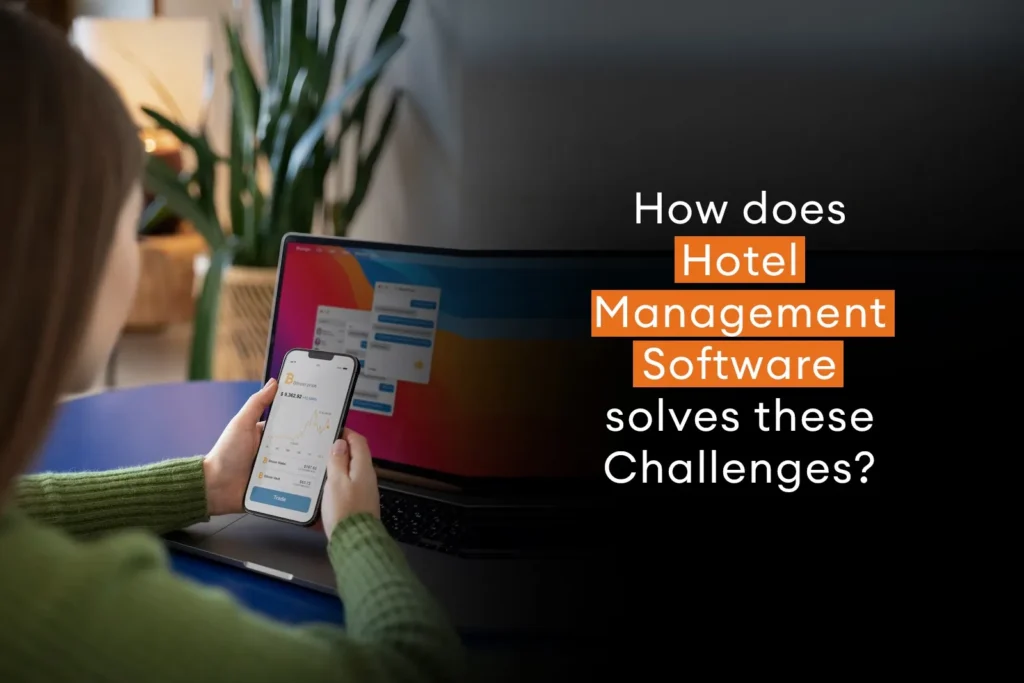
Modern hotel management software completely changes how hotels run their business, turning separate, disconnected processes into smooth, connected workflows. These hotel management software solutions solve the common challenges in hotel management that hotels have struggled with for years. With this software, hotels can give guests a better experience while also improving their business results.
1. Front Desk Automation and Real-Time Check-In Systems
Advanced PMS platforms facilitate seamless check-ins through mobile/kiosk options and pre-arrival data collection. Integration with payment gateways enables secure, contactless transactions, while digital key systems eliminate physical key management. Staff are freed from repetitive tasks to focus on personalised guest interactions, reducing wait times by up to 70% and significantly enhancing arrival experiences.
2. Smart Inventory & Room Allocation with PMS Integration
Automated inventory systems provide real-time room status visibility across departments through cloud-based platforms. Intelligent allocation algorithms optimise room assignments based on stay duration, revenue potential, and guest preferences. Integration with housekeeping modules enables immediate status updates, facilitating faster room turnovers and maximising occupancy rates through more efficient inventory management.
3. Channel Manager Integration to Prevent Overbookings
Sophisticated channel managers synchronise inventory across all distribution platforms in real-time, automatically adjusting availability when bookings occur on any channel. Two-way integrations ensure rate parity across platforms while allowing centralised rate management. Reservation rules and stop-sell thresholds automatically prevent overbookings during high-demand periods, protecting the hotel from costly resolution expenses and negative guest experiences.
4. Guest CRM & Loyalty Program Features for Retention
Comprehensive CRM systems create unified guest profiles by capturing data from all touchpoints—bookings, in-stay purchases, preferences, and feedback. Automated communication tools deliver personalised pre-arrival, during-stay, and post-departure messages based on guest history. Integrated loyalty programs track points, automate rewards, and incentivise direct bookings, increasing repeat business and lifetime guest value.
5. Dynamic Pricing Engines for Revenue Optimisation
Sophisticated revenue management systems analyse market demand, competitor rates, and historical data to automatically adjust pricing across all channels. Machine learning algorithms identify booking patterns and optimise rates for different room types and stay dates. Automation enables the implementation of advanced strategies like length-of-stay restrictions and early booking incentives, maximising Revpar without constant manual intervention.
6. Task Automation and Staff Communication Dashboards
Digital task management systems prioritise and assign work based on urgency, location, and staff expertise. Mobile applications provide real-time notifications to appropriate team members with detailed instructions. Completion tracking creates accountability while performance analytics identify efficiency opportunities. Integrated communication platforms break down departmental silos, ensuring seamless service delivery across the property.
7. Feedback Systems and Review Management Tools
Automated post-stay surveys capture structured feedback while sentiment analysis tools monitor online reviews across platforms. Immediate alerts for negative feedback enable rapid service recovery, while response templates help maintain a consistent brand voice. Analytics identify recurring issues for systemic improvements, while positive review identification creates opportunities for showcasing excellent experiences in marketing materials.
8. Advanced Analytics & Customizable Reports
Business intelligence dashboards visualise key metrics in customizable formats, making complex data accessible to all decision-makers. Automated reporting delivers critical insights on schedule to relevant stakeholders. Predictive analytics forecast occupancy, revenue, and staffing needs based on historical patterns and current trends. Cross-departmental data integration reveals previously hidden relationships between operational factors and business outcomes.
Features to Look For in a Hotel Management Software
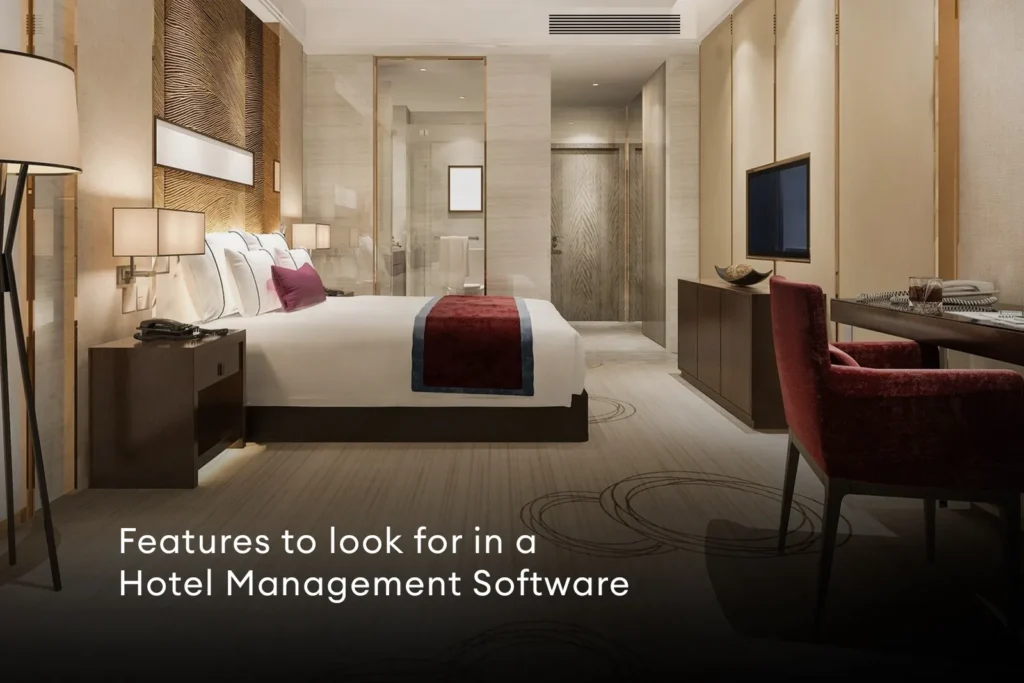
Selecting the right hotel management software can dramatically transform operations and guest experiences. The most effective solutions offer comprehensive functionality while remaining intuitive and adaptable to your property’s unique needs. When evaluating potential software options for your hotel, certain key features stand out as particularly valuable for optimising operations and driving business success.
1. User-Friendly Interface with Mobile Compatibility
The software’s interface should be intuitive enough that staff require minimal training, with consistent navigation and visual design across all modules. Mobile responsiveness is essential, allowing managers to monitor operations and make decisions remotely while enabling staff to update information from anywhere on the property. The best systems offer role-based access controls, presenting each user with only the functions and data relevant to their responsibilities.
2. Comprehensive Reservation Management System
Look for systems offering multi-channel booking capabilities that display availability across all platforms in a unified calendar view. The reservation system should support various room types, rate plans, packages, and special offers with flexible modification capabilities. Advanced features include automated confirmation emails, deposit handling, cancellation policy enforcement, and waitlist management that converts to bookings when cancellations occur.
3. Integrated Payment Processing Solutions
The payment system should support multiple payment methods, including credit cards, digital wallets, and direct bank transfers, with robust encryption and PCI compliance. Look for automated pre-authorisation, incremental authorisation for extended stays, and secure tokenisation capabilities. Advanced systems include automated invoicing, split billing options, and detailed financial reporting that integrates with accounting software.
4. Housekeeping and Maintenance Management
Effective solutions provide real-time room status tracking with automated task assignment based on check-ins, check-outs, and stay-overs. Digital checklists ensure quality standards are maintained, while photo documentation capabilities help track maintenance issues. The best systems include inventory management for consumables and predictive maintenance scheduling that minimises guest disruption and extends equipment lifespan.
5. Comprehensive Guest Relationship Management
Look for systems that build unified guest profiles from all interactions, tracking preferences, special requests, spending patterns, and stay history. Advanced CRM features include automated communication triggered by reservation milestones, personalised upsell recommendations, and post-stay engagement sequences. The system should integrate with loyalty programs, recognising and rewarding repeat guests while encouraging direct bookings.
6. Revenue Management and Dynamic Pricing
Sophisticated revenue management modules analyse historical data, market demand, and competitor rates to recommend optimal pricing strategies. Look for automated rate adjustments based on occupancy thresholds and booking pace analytics. Advanced systems include forecasting tools, displacement analysis for group bookings, and channel-specific pricing strategies that maximise overall revenue while maintaining strategic rate parity.
7. Comprehensive Reporting and Analytics
Effective hotel management software provides customizable dashboards displaying key metrics like occupancy, ADR, Revpar, and department performance. The reporting system should offer both pre-built reports for common needs and custom report builders for unique requirements. Advanced analytics features include trend identification, performance benchmarking against market data, and predictive analytics that forecast future performance.
8. Open API Architecture for Third-Party Integration
The most versatile hotel management systems offer a well-documented API that enables seamless integration with specialised third-party solutions. Look for pre-built connections to popular distribution channels, payment processors, and guest engagement platforms. The software should allow for custom integrations with property-specific technologies like smart room controls, energy management systems, and unique guest service applications that differentiate your property.
Looking for Hotel Management Software Development? Contact us
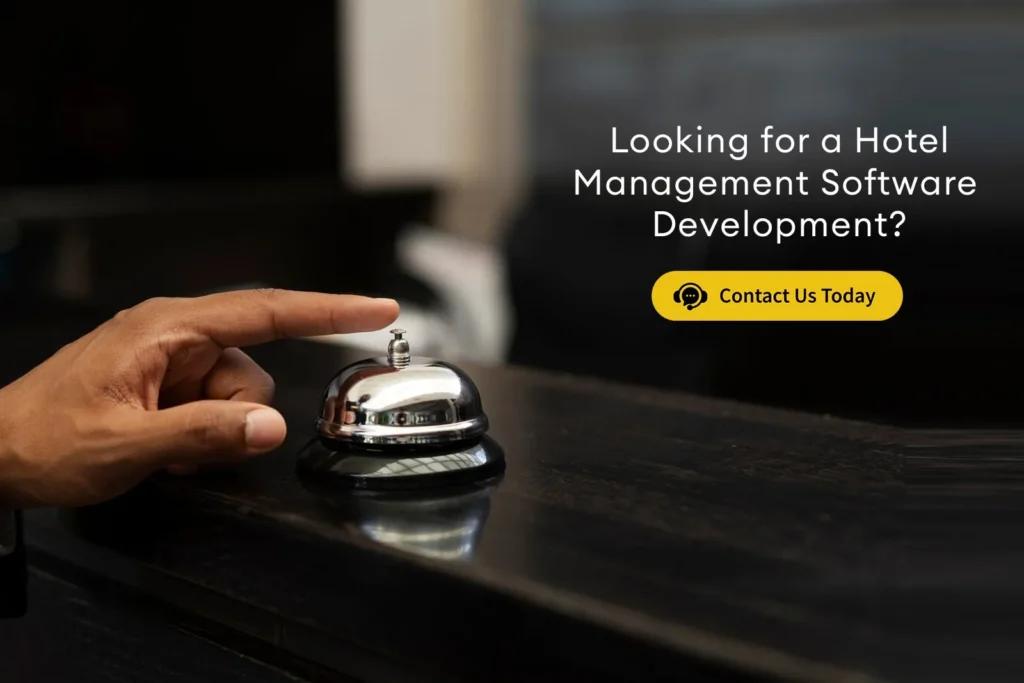
In today’s intensely competitive world of hospitality, traditional software probably won’t be able to provide solutions for the common challenges in hotel management. At Colourmoon Technologies, we develop customised hotel management systems just for you. The software fits exactly into the way your hotel works, upholds your brand, and really helps you in achieving your growth targets.
Why Choose Colourmoon Technologies?
With more than a decade and a half of experience working with properties from boutique hotels to global chains, our development team brings extensive hospitality industry experience and modern technical insight. We design end-to-end digital ecosystems that adapt to the growth of your business. Our hotel management solutions stand apart through:
- Tailored Development Approach: Unlike generic solutions, our development process begins with a comprehensive operational analysis, identifying your unique challenges and opportunities. This ensures the final product addresses your specific pain points rather than forcing your operations to conform to pre-defined software limitations.
- Seamless Integration Capabilities: Our development team excels at creating solutions that integrate flawlessly with your existing technology stack, from legacy systems to emerging Iot devices. This eliminates data silos and creates a unified operational environment where information flows effortlessly between departments.
- Future-Proof Architecture: We build with scalability in mind, utilising cloud-native technologies and microservices architecture that allow your system to grow alongside your business. Our solutions remain adaptable to emerging technologies and changing market conditions without requiring complete rebuilds.
- Dedicated Support Partnership: Our relationship doesn’t end at deployment. We provide comprehensive training, 24/7 technical support, and regular system enhancements that ensure your solution continues delivering value for years to come. Our client retention rate of 96% speaks to our commitment to long-term partnerships.
Our Development Process
- Discovery & Requirements Analysis: We conduct thorough operational audits and stakeholder interviews to document your unique workflows and challenges.
- Custom Solution Design: Our architects create detailed blueprints for your system, emphasising intuitive user experiences and operational efficiency.
- Agile Development: Using iterative development methodologies, we deliver functional modules for testing and feedback throughout the development process.
- Comprehensive Testing: Rigorous quality assurance includes performance testing, security audits, and user acceptance validation before deployment.
- Implementation & Training: We provide smooth transition planning, data migration, and comprehensive staff training to ensure rapid adoption.
- Ongoing Support & Evolution: Regular performance reviews, proactive maintenance, and planned enhancement cycles keep your system at the cutting edge.
Ready to Revolutionise Your Hotel Operations?
Contact our team today for a consultation and discover how Colourmoon Technologies can transform your hotel operations with custom software that works exactly the way you do. Whether you’re looking to increase operational efficiency, enhance guest experiences, or maximise revenue potential, our customised approach ensures your technology investment delivers measurable returns from day one.
Conclusions
The hospitality sector is changing quickly, with guest needs becoming more demanding and operations more complex. As discussed, hotel managers currently face common challenges in hotel management, including front desk slowdowns, inventory issues, difficulties optimising revenue, and problems retaining guests. But these challenges are solvable.
Modern hotel management software provides complete solutions that turn these difficulties into chances for excellent service and operational efficiency. By incorporating essential functions into combined platforms, this tech removes the operational silos that have hindered hotel operations, creating smooth experiences for both staff and guests.
When choosing hotel management solutions, prioritising user-friendly interfaces, detailed reservation systems, and advanced analytics ensures you choose tech that significantly impacts your business. Whether using existing off-the-shelf solutions or partnering with a developer like Colourmoon Technologies for custom software, the correct tech can drastically change your property’s performance. Contact us today to pick up a software with features that address your unique operational needs and improve your hotel’s performance, and build a foundation for continued growth.
Hotels that adopt comprehensive management software can offer superior guest experiences while improving operational efficiency and profitability. The key question isn’t whether to invest in hotel management tech, but which solution will best set up your property for success in a competitive market.


